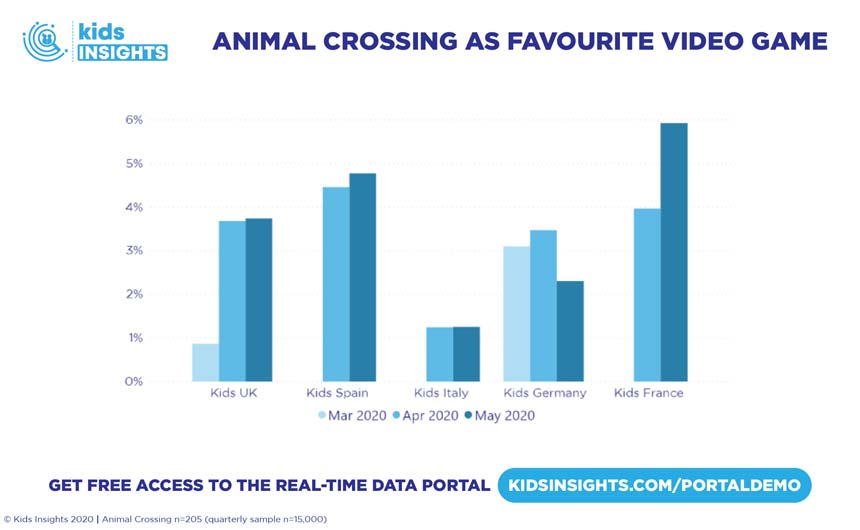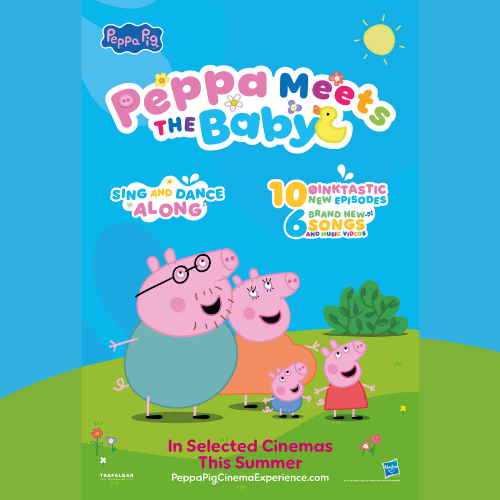Kids Insights’ latest Trend Alert On-Track report shows that 1 in 5 Animal Crossing players are making offline purchases based on the game.
Latest data from Kids Insights has further underlined that Animal Crossing is one of the winners from lockdown.
The research specialist has issued its latest Trend Alert On-Track reports which focus on the global and flash trends occurring in the world of kids, highlighting the latest trends, opportunities and possible implications on the kid’s industry.
The latest reports explore how quickly children adapted their lives since lockdown started, and how this has impacted their attitudes, behaviour and consumption – all of which are becoming increasingly digital centric.
While kids favourite hobby across Europe remains football, the restrictions of not being able to play and watch football has seen a significant decrease in the number of kids talking about it, with a decrease of nearly 90% in Italy.
However, while conventional sports are reducing, esports are booming with kids shifting their attention and focus to watching and playing esports games. In the UK, teenagers watching esports increased by 28% from 16.7% in March up to 22.5%, equivalent to 883k viewers in April.
Boys continue to be more likely to be avid gamers with it being the second favourite hobby (15%) in 2020, second only to football (22.3%). Quarantine has driven more children to take up gaming – with younger girl teens (13-15) increasing their video game playtime by 28% in the UK (38% in Spain) from March to April alone, averaging 1hr 02m in April and now up to 7 hours per week.
While the majority of esports viewers are boys, the number of girls watching increased by a third over the quarter, estimating around 40,000 more girls who are watching esports now.
Nintendo’s Animal Crossing – a social ‘open-world’ game – is the fifth instalment of the Animal Crossing series developed and published by Nintendo and was launched on March 20, 2020. It has performed impressively in the data and has quickly become the third favourite game on a console with teen girls in France, 4th in Germany, 6th in the UK and 8th in Spain.

“Over the last two years we have spoken about how the next generation of kids don’t expect to passively consume content – they want to co-create, build and develop the content to get much more personalised experiences and reflects in our latest Trend Alert Reports,” explained Jonathan Watson, cpo at Kids Insights. “Some of the most popular games to take this approach over the last two years include Roblox, Fortnite and Minecraft. Based on our data it looks like Animal Crossing could be about to join that coveted list.
“The fifth instalment of Animal Crossing is currently breaking through due to its unique customisation, giving kids a platform to be creative and play in an open world environment which appeals to gamers looking for relaxed and social gameplay.
“As a result, agile brands can utilise these new platforms to increase brand awareness and engage with their audiences.”
This is likely to have a big impact on retail, licensing and merchandise in terms of collaborations – Kids Insights’ data shows that 17.2% of kids who named Animal Crossing as their favourite game also purchase clothes relating to their favourite video games.
This means that Nintendo’s decision to sell products via the My Nintendo shop could prove to be a successful one.
One of the game’s key features is being able to customise clothes, as well as acquire branded clothes in the game. This has been replicated through Nintendo stores in Tokyo with the production of merchandise, and replicating the creativity of the game with furniture for your own house inspired by the game, as well as clothing and decorative items.
Yesterday, Source reported that Millimage’s Molang brand has launched five in-game looks on the video game smash hit, Animal Crossing: New Horizons, as part of its global strategy to reach Millennials and Gen Z audiences.
Kids Insights’ On-Track reports are based predominantly on the results of surveying more than 15,000 children across the UK and Europe over the last 12 weeks (between February 1 and April 30, 2020), though also
utilise data which has been collected dating back to May 2017.
Want to read more news like this? Simply sign up to our daily digest by clicking here. You can also follow @LicensingSource on Twitter and @licensing_source on Instagram.

































